#dykes and books best combo
Explore tagged Tumblr posts
Text
sigh (no one in this room knows that when i call myself a lesbian i say it with the full force of elizabeth bishop, ruth jamison, shug avery, cheryl dunye, virginia woolf, mary oliver, lolly willowes, sally seton, gertrude stein, and vita sackville west behind me)
#dykes and books best combo#virginia woolf#someone revive lesbian literature RIGHT NOW please#dykeposting
2 notes
·
View notes
Text
17 questions!! 💙🌹💙🌹
tagged by @trbd thank u!!!!!
name: rose!! katie if you know me irl
zodiac: taurus sun, double libra!!
height: 5’3” on a good day!
last thing you googled: dndbeyond!! we played today, my sister dmed!!!
song stuck in head: friends on the other side
number of followers: 332!!
hours of sleep: 8 usually!! rn im not sure though
lucky number: 6!!!!!! the best number!!!!!!!!!!!!
wearing: tank top and shorts!!! the tank top says summer vibes on it.
favorite song: war on women by yacht!! great combo of fun and funky techno beat & social satire that was actually written by a member of the group its about
favorite instrument: bass!!! electric bass or standing, really, both are so cool!!!! closely followed by viola 💙💙 underappreciated queen
favorite author: idrk!! i read a lot of sarah dessen but thats just bc i love her books, theyre rly bad for me to read though. no enrichment whatsoever.
aesthetic: dyke punk tbh, leather jacket with lesbian pins on it & flower embroidery + docs with flower embroidery are my two main outfit items
random: i have a very fun combination of Tragique Backstory and Embarrassing Personal History that makes me both the sympathetic antagonist and the comic relief bff of my own story
i tag: @fagfrog @hitonakase and anyone else who wants to!!
7 notes
·
View notes
Text
LACK THE LOW INTERVIEW
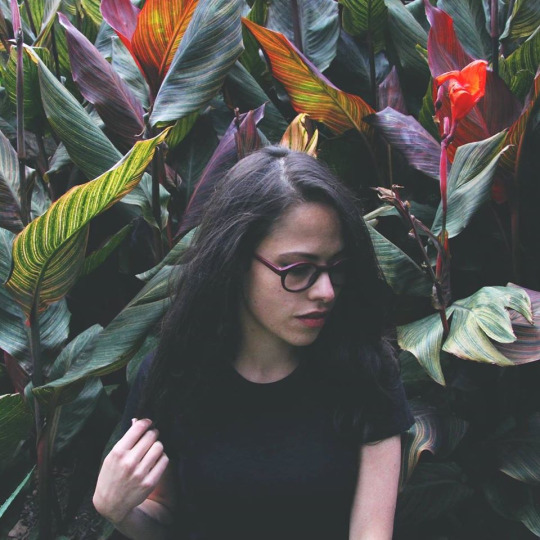
Lack The Low( Kat Hunter) an independent artist who crafts atypical auditory alchemy with her music.Lack The Low’s sound traverses throughout the neural networks of many different genres like an experienced traveller with a multitude of sonic synonyms under her belt. Her debut album One Eye Closed is an intriguing beast that never fails to grant the listener with something new without being gaudy or using tools for tools sake.
Lack The Low - God Knows Why
youtube
Tell me about your first introduction to music and what was the catalyst or first piece of music that you can recall connecting with that made you start thinking about becoming a musician?
Really, I don’t remember not being a musician. My mother is a pipe organist and my dad a singer, so when I turned four years old they told me to pick an instrument and so I started violin lessons. Equally, it’s difficult to pinpoint a moment where I “committed” to music. When I finished high school, I had to choose between studying music or studying dance at university (I’d been deeply involved in both up until that point), so that was a big decision at the time. But really music is kind of a thing that happened to me; a constant in my life. I remember writing songs from about age 6 and one time I sang a tune I’d written to my mother, and she showed me how to write it out on manuscript and harmonise it on the piano, and I think that’s the first time a light bulb went off in my head about what it might mean to “write music”.
What was the first piece of music you bought with your own money and personally sought out to buy and what drew you towards wanting to buy and listen to your first purchase?
Back when I was a kid, CD singles were a big thing. I think the first CD I ever purchased was Macy Gray’s, “I Try”, which in hindsight has aged well (what a banger!), but the first CD I really fell in love with was Alanis Morrissette’s “Precious Illusions” single circa 2002. I really remember connecting with the lyrics, and her emotional singing style.
What albums/artists/bands or art forms shaped the scope of your musicianship and how you approach the music you write? How do you push yourself and how important do you think that it is for musicians to push past the limits with what they create?
I listened to a lot of indie rock all through high school and gradually got into some weirder things over time. Radiohead was a massive influence for me and Amnesiac is still one of my all time favourite albums. Specifically Silverchair’s Diorama album was a big influence for me: it’s harmonically super complex and beautifully orchestrated by Van Dyke Parks. The Most Serene Republic were also really influential for me, and more recently These New Puritans. But overall my listening habits are actually pretty wide, so what I make is just as much a synthesis of all the instruments I’ve played and styles I’ve listened to over time.
Lack The Low-Future Heavy
youtube
I don’t really think it’s important to push yourself. I think making music is probably hard enough as it is, and trying to make something that sounds difficult might just result in something that sounds contrived, which is not really interesting to me. I think the real challenge of composition is to try to let through what comes most naturally and not overthink everything; to just be a conduit and serve the purpose of the song as purely and as authentically as possible.
Tell me about the steps you had to take in order to develop the facility/skills to create the music you make, did you have lessons or was there a method of study or practice you followed? Was there any specific musicians that inspired you?
I had violin lessons through my childhood and saxophone lessons in high school and joined the school big band. Then towards the end of high school I started studying voice. I also started self-teaching piano and guitar along the way, and did grades in music theory as well. When it came to making work for Lack the Low, I also had to learn to record and mix everything. I already had some basic DAW skills from previous bands, but in 2015 I went really deep with Ableton and got into more if its functions, especially using samples and soft synths. I spent a number of months doing an online mixing course too, which gave me enough overview to get started. I wouldn’t call myself a very good engineer; I don’t think I have a very good mindset for the science behind it all. But I learned just enough to start producing my own work.In terms of self-producing, there’s a local musician called Aphir, who I’m close friends with and who is an incredibly good producer and engineer, and seeing her play live was a big inspiration for me to learn more about technologies that could allow me to become a more self-sufficient artist. With Ableton and a lot of hardware/software technologies, you really have to have good role models and people you can go to with questions because you come across issues that really aren’t self-evident. There’s a lot of trial and error and a lot of troubleshooting.
Lack The Low-The Daylight Is All Inside
youtube
How do you maintain your level of musicianship and ensure that you are becoming a better musician?
I practice singing daily, and I work as a singing teacher, so I spend a lot of time overall on my voice, and a lot of incidental time studying voice pedagogy and science. I also try to get in piano practice daily, and violin practice when I can. This year I started taking violin lessons for the first time in about 14 years, and piano lessons for the first time ever, so I’m focusing much more on building and keeping up my technique in those areas. But for the most part I find myself wishing I had the time to do more!
Tell me about how Lack The Low formed and what led you to starting this project? What were your creative intentions/musicals goals you had from the beginning and how has that changed from then to now?
Although there wasn’t a single moment, I feel it formed in around 2015 when I’d just moved back from the UK. While I was overseas I didn’t make that much music and didn’t have much of a musical support network, but when I moved back to Australia, I also started doing the Artist’s Way course and I felt like making something. I’d become very burned out being in previous bands and had felt really disillusioned by the music industry, so it took some real mental reframing to want to make music again. My only goal was basically, “Let’s see if I can make a whole album of music all by myself”. I didn’t want to think about releasing it, or whether it would be good or not, or whether anyone would hear it or like it, I just wanted to feel like I was capable of finishing a project of my own volition and gain the skills along the way to do that. And that took me three years, but I managed to do it. But when it came to releasing and having other people hear my work, I was kind of dumbfounded by the whole process. I had no expectations, so I took every lesson (good and bad) as gratefully as I could. Now my goals have much more of a sense of reality to them – it’s not just me making work in a vacuum for better or worse. Being able to complete my initial goal gave me some self-belief, so I’ve now been experimenting with different sounds and different aesthetics, trying to make more active decisions across the board.
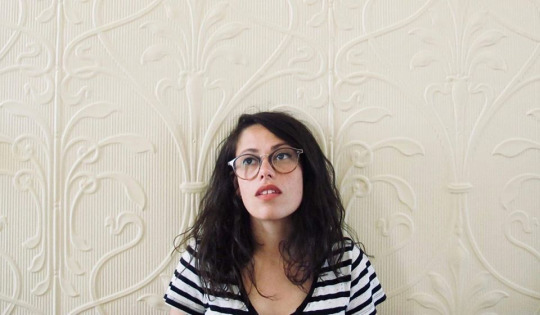
My favourite thing about your debut is all the different musical directions and ideas that come together. How do you begin the songwriting process and how to approach connecting all of those different sections together? Is there a method that you follow or does it depend on what type of song you are working on?
I wish I had a process! Every song starts differently. In many ways I’m still a very traditional song writer in that I think of most songs initially as lyrics, melodies and chord progressions. It doesn’t come naturally to me to think texturally or in terms of sound design. So, some songs come fully formed and I write the lyrics in a single day, whereas some songs are slowly put together or given up on then revived over a number of years. Very occasionally I’ll start a song in-the-box but normally I write at the piano or combo organ or guitar. I feel much more at home with a real instrument in my hands. And then after that, the production often takes a really long time. I end up to-ing and fro-ing between different ways of fleshing things out, and eventually stitching it all together. I think that’s a reason many of my arrangements end up so Frankenstein’s monster-y. To some degree I’m going in blind without any assumptions and hoping ideas come to me that will best serve the song – that’s always the goal: to serve the emotion of the song. I think I really have no idea what an actual producer does or how they get anything done; for me production is like making a tapestry and it all takes forever.
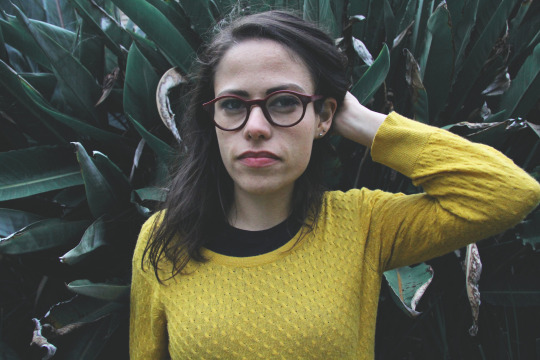
Was your debut a concept record or anything you considered in terms of a narrative between the songs or the whole album? What did you want the listener to experience, think or feel with this release?
No, it’s not a concept record… I mostly tend to just focus on each song having its own world and meaning, and then staying as true to that single vision as possible. There’s a lot of different themes on the record, but a lot of it has to do with dark sides of humanity and personal growth. Some songs feel quite dystopian to me because I’m taking a kind of dark psychological theme and pushing it to its nth. The most important thing for me is that each song is really emotionally resonant in its own way. Complexity can be great and thought provoking, but communicating in an emotionally engaging way is really my main goal.
What were the main influences that you drew from when you were working on your debut album?
My influences can come from anywhere, but normally my songs are about philosophical ideas I’m trying to get my head around. Sometimes I find myself being really inspired by computer games, books, TV shows or films – anything that speaks to an idea that latches onto my brain.
How do you transfer the arrangements to a live setting since there’s an abundance of different instruments? Is this something you have to constantly think about when composing?
The answer is I don’t think about it at all when composing. But I really should. It would be way more sensible to only use sounds that I can replicate in a live setting,and one day I’d like to do a project like that again.
Lack The Low-Progress (Live)
youtube
(Recorded live, January 6th 2020, by Royal Ubiquitous Handycam)
But because I don’t have a band, I really took nothing for granted with this project. I remember having a realisation when I first started producing music for myself that was something along the lines of, “hey, I don’t even have to use hi-hats”. It sounds obvious, but I’d come from bands where you have a bassist and guitarist and drummer, and they all have to be playing for most of the song, and there are assumptions that each person makes about what kind of tones or parts of their instrument they’ll default to using. But I found it really freeing to realise I wasn’t constrained by that anymore. I didn’t have to feel guilty about not using cymbals for a whole song, like I’d be letting anyone down.
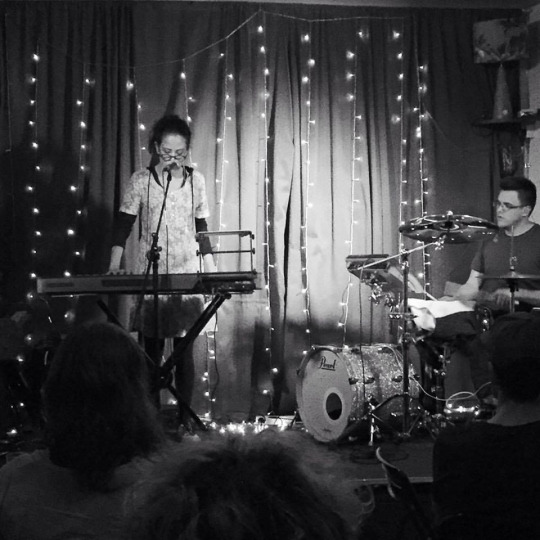
Also, there are a lot of sounds that are completely unreproducible live. For example, there are bird sounds and machine sounds that are field recordings I took myself that have been digitally twisted beyond recognition. There’s banjo in just one song, and bagpipe samples in another. It would be a total nightmare to make happen in the real world, note-for-note.
The one thing that did influence the writing process was when I was getting closer to completing the demos and recording everything, I’d locked in a really amazing trumpet player and French horn player to record the parts, and that made me really confident to go all out in the horn arrangements, especially for Seven Different Species – the trumpet and horn duet in that song is one of the things I’m proudest of.
Do you have a set rule or philosophy of how you want both of the different realms of performing live and what you hear on record? Do you think that everything should be repeated live as its heard or that the audience want to experience something that can only be witnessed from being at a show?
I think this depends on what part of the album/composition cycle I’m in. Generally what I find is that during the writing phase what you see live is fairly representative of what’s probably going on in my Ableton file, and more representative of how the recording is (or at least is at that moment). And if I’m in the release stage I do feel a certain obligation to have live versions sound enough like the recording. But after that I can depart pretty dramatically from the original recorded version, sometimes to the point where it’s almost unrecognisable.
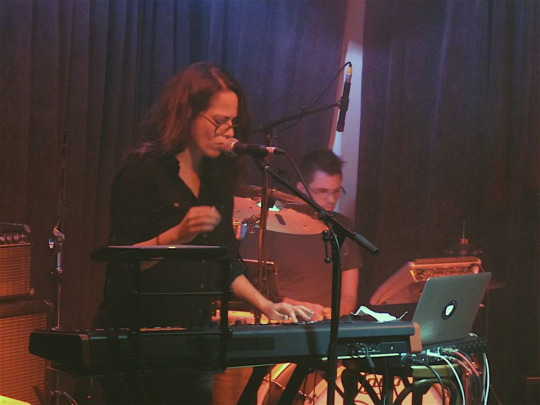
I think this process is reflective of what it’s like to prepare for a live show as an electronic musician (and although my compositions don’t always sound electronic, I’m still using tools and a workflow that has its foundations in electronic production). When you’re in a band, you can take a written song to your band members, and they flesh it out for you and maybe you add it to your live set, and the song develops over time as a live performance potentially long before ever being recorded in any way. Whereas as an electronic or self-produced musician, you have to work in the opposite direction; often ending up with a recording long before you figure out how to deconstruct it or make it a performative “live” experience. And in my experience this creative deconstruction can happen more and more to a composition over time.
Tell about your live setup and the preferences within your setup? Is it combination of software and hardware instruments to emulate what is on the recorded album? Does this differ between what you use when recording and what you using in a live setting? Please go into detail for all of the gear ends out there.
My live set up changes pretty regularly, but currently most of the time I’m playing solo. I’m using a midi keyboard and a Novation launchpad going into Ableton. I’m mostly using the launchpad to trigger clips or to control Live’s looper, to make vocal loops. The keyboard is going into a variety of piano, synth and organ sounds, and I also have some additional vocal FX mapped to this so I can turn them on and off quickly. And then it all goes out through an interface and that’s about it! I’ve been trying to keep my live show as simple and effective as possible because I have the tendency to over complicate things, which then makes shows more stressful than they need to be.
You can purchase/stream/download Lack The Low’s music from the following links below and please follow these pages to keep with regular updates from the band:
https://linktr.ee/lackthelow
https://lackthelow.bandcamp.com/
https://open.spotify.com/artist/7BdQjLu3Ryk5DoQHQwYJ5a
https://www.instagram.com/lackthelow/?hl=en
https://www.facebook.com/LackTheLow
Marks Of Provenance III - A Bushfire Fundraiser by Provenance
All proceeds from the 14-track compilation will go directly to those affected by the Australian bushfire emergency via the Fire Relief Fund for First Nations Communities. The fund has been established by First Nations musician Neil Morris, in direct consultation with, and upon the request of, fire-affected First Nations communities, including those who have lost their homes and been forced to evacuate to other regions.
Lack The Low will be playing at Arctangent Festival in the UK this year! Make sure you get out there and watch her set!
https://arctangent.co.uk/tickets/
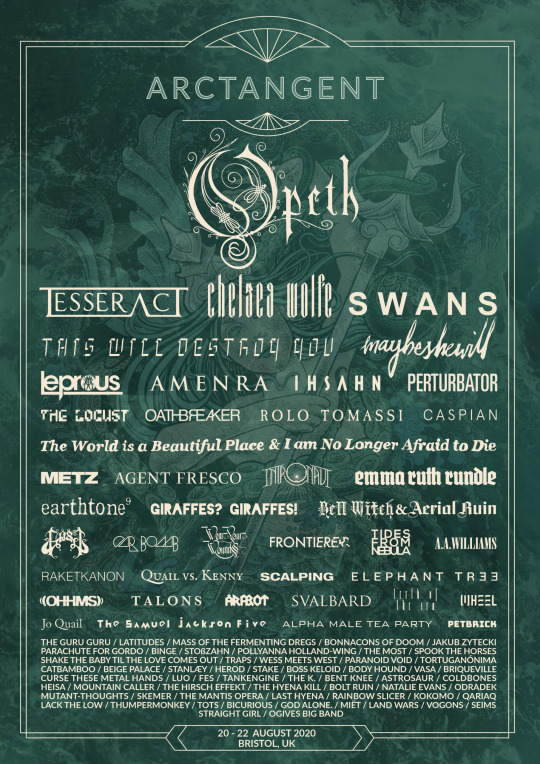
1 note
·
View note